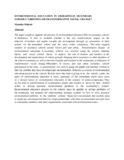Please use this identifier to cite or link to this item:
https://cris.library.msu.ac.zw//handle/11408/1966Full metadata record
| DC Field | Value | Language |
|---|---|---|
| dc.contributor.author | Mukoni, Manuku | - |
| dc.date.accessioned | 2017-05-29T10:43:00Z | - |
| dc.date.available | 2017-05-29T10:43:00Z | - |
| dc.date.issued | 2013 | - |
| dc.identifier.uri | https://www.researchgate.net/publication/277015773 | - |
| dc.identifier.uri | http://hdl.handle.net/11408/1966 | - |
| dc.description | A publication by Mrs Manuku Mukoni a Lecturer in the Department of Gender Studies, Midlands State University | en_US |
| dc.description.abstract | The paper sought to appraise the practice of environmental education (EE) in secondary schools in Zimbabwe. It tries to establish whether it has any transformative impact on the behavior of teachers and pupils towards the environment through an assessment of their actions on the immediate school and the outer wider community. The study targeted teachers in secondary schools around Gweru peri and urban. Transformative impact of environmental education in secondary schools was assessed using the systems thinking theory and social critical theory to analyze the role of learners and teachers in the development and maintenance of school grounds, bringing about awareness to other members of the school community as well as the role of pupils and teachers in the community as indicators of transformative social change.100 teachers in Gweru peri and urban secondary schools participated in the study .A questionnaire was used to gauge the pupils and teachers’ actions to find out whether they have developed pro-environmental behavior as a result of environmental education practice in the schools. Results show that what is going on in the schools under the guise of environmental education is mere ‘greening’ of the curriculum which takes more of a factual stance of environmental education at the expense of action competence. They do not lead to transformation of communities, pupils and teachers as shown by their limited action in solving practical environmental problems in the community’s context. Environmental education practice in the schools must be applied in solving problems of the community and promote the understanding amongst students on how to solve practical environmental problems in the students’ context. Study also recommends that teachers need to model pro-environmental behavior, forge partnerships with other environmental stewards such as community members and other organizations concerned with environmental issues. | en_US |
| dc.publisher | Asian Economic and Social Society | en_US |
| dc.relation.ispartofseries | International Journal of Asian Social Science;Vol. 3, No. 4: p. 971-991 | - |
| dc.subject | Environmental education | en_US |
| dc.subject | Transformative social change, action competence | en_US |
| dc.title | Environmental education in Zimbabwean secondary schools: greening or transformative social change? | en_US |
| item.fulltext | With Fulltext | - |
| item.grantfulltext | open | - |
| Appears in Collections: | Research Papers | |
Files in This Item:
| File | Description | Size | Format | |
|---|---|---|---|---|
| ENVIRONMENTAL EDUCATION IN ZIMBABWEAN SECONDARY SCHOOLS.pdf | Abstract | 109.54 kB | Adobe PDF |  View/Open |
Items in MSUIR are protected by copyright, with all rights reserved, unless otherwise indicated.



